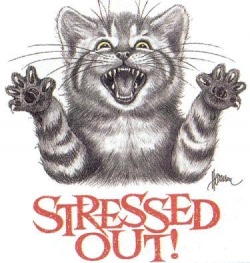The effects of sleep deprivation are so severe that the subject of not getting enough sleep should never be skimmed over. A surprisingly large percentage of people are not getting the quality and quantity of sleep that they should. The human body has a natural sleep/wake cycle (circadian cycle) that is in time with the sun and the planets. What this basically means is that when the sun sets and it gets dark we should get tired and go to sleep and when the sun rises and it gets light we are designed to wake up and get ready for the day. This is not just humans that work this way, as light has a huge influence over the physiology of all life and nature. When the solar eclipse happened in 1999, birds, horses and many other creatures went to sleep in the middle of the day when the sun eclipsed.
How does this happen?
When light from the sun or artificial light stimulates your skin or eyes your brain and hormonal system think its morning. This will make your adrenal glands secrete the hormone cortisol which will wake you up and prepare your body for the day. Your cortisol levels peak at around 6-9am then drop a little but remain elevated throughout midday to support daily activities. In the afternoon cortisol levels drop significantly, especially as the sun goes down. These decreasing cortisol levels allow the release of melatonin and growth and repair hormones.
If our bodies follow the natural sleep/wake cycle we should start winding down as the sun sets and should fall asleep by about 10pm. Physical repair mostly takes place between 10pm - 2am and after 2am psychogenic (mental) repair takes place.
This is all supposed to happen in an ideal world or at least it did happen in the past. But now with all the artificial light, television, computer games, parties, etc our cortisol levels don't drop as they should towards the end of the day which results in a hormone imbalance and reduced repair hormones being released. Also as we have this artificial light to keep us entertained way past sun set, we only go to bed around 12am or later! This results in not only poor sleep quality but sleep deprivation.
So what are the effects of sleep deprivation? Here is a short paragraph on three parts of the body that are severely effected by sleep deprivation.
Hormonal - A Lack of sleep can cause havoc with hormones and the glands that release them. Not getting enough sleep will increase your cortisol levels and decrease testosterone and growth hormone. The end result of this will be less muscle and more fat. This will get worse as well because your metabolism will have dropped due to having less muscle. It is a major contributor to adrenal fatigue with leads to depression, chronic fatigue syndrome, viral infections, bacterial infections, fungal infections, headaches, weight gain, reduced sex drive, lack of energy and many more.
Physical - The effects of sleep deprivation on your performance is that your performance is severely reduced when your not sleeping correctly. You will not only feel tired and fatigued all day but training at the gym will feel a lot harder than it should do. This will obviously mean that your session will be less effective and you will relate the gym with bad experiences which means you will soon give up going.
Mental - The effects of sleep deprivation on your mental health are probably the most recognizable and worrying. It ranges all the way from not being able to concentrate, getting grumpy and ratty with people for no reason, forgetting things, showing dyslexic tendencies all the way up to hallucinating, dizziness, depression.
So how can you make sure the effects of sleep deprivation doesn't happen to you?
* Make sure your bedroom is pitch black - Light hitting your skin or eyes will disturb your sleep.
* Start winding down at the end of the day - If you begin to turn lights down or off at least 2 hours before you go to bed then your body recognizes this as sun set and time to sleep.
*Go to bed by 10pm and be asleep by 10.30pm. Waking up is less important to address as your body should start to wake up when it needs to, but around 7 is advisable.
* Avoid the consumption of stimulants (caffeine, sugar, cigarettes) after lunch.
* Drink plenty of water. If your body is dehydrated then it treats this as a stress. Stress equals the release of cortisol which wakes you up!
* Unplug all your electrical items for a few nights and see if your sleep improves. If it does you should keep all electrical items as far away from your bed as possible. The low frequency electromagnetic energies can disturb your sleep.
* Try exercising through out the day. This can help you to sleep at night. However if you exercise in the evening and the exercise is intense and longer than 30 minutes this can disrupt your sleep by releasing too much cortisol.
James is a coach at the Dax Moy Personal Training Studios, Islington, where he works with clients to achieve rapid fitness and fat loss results.
To find out more or to contact James with questions related to this article please visithttp://jameswhitepersonaltraining.co.uk
If you are interested in building muscle and burning fat then visit my site at http://build-muscle-burn-fat.com to learn how.
Article Source: http://EzineArticles.com/?expert=James_J_White

 RSS Feed
RSS Feed